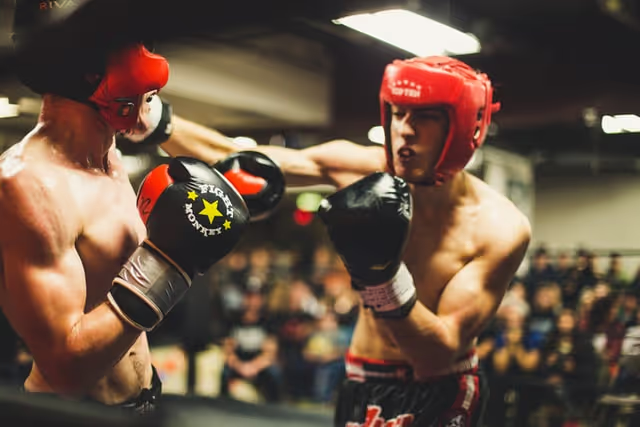
Blog
How to Diversify Your Investments the Smart Way
Make yourself as indestructible as possible
The last few years have been a great reminder that there is no hiding from the challenge’s life will throw at all of us. This is as true as it is for your finances, career, and investments as it is for any other area. Ups and downs are inevitable, it's just how you handle them that matters.
Against the backdrop of a changing world, diversification is a way to make your finances as indestructible as possible.
What Does Diversification Mean?
With investing, diversification means investing in a variety of different types of investments, usually with a diverse mix of differing risk levels.
Why Diversify? – To Handle the Punches That Will Come Your Way
The famous world heavyweight championship fight was held in Zaire – now the Congo. Promoted by Don King as “the rumble in the jungle”, it pitched George Foreman against Muhammad Ali.
Coming into the fight, undefeated George Foreman had won all 40 of his fights, 37 by knockout. He knocked out both fighters who had previously beat Ali. Foreman was feared for his raw punching power and physical dominance, so few gave Ali much of chance. Foreman was 3-1 favourite, and even Ali’s own people had their doubts about the fight.
During the fight, Foreman pursued Ali. Foreman stalked him without mercy or empathy around the 20-foot ring, just like everyone thought he would. Power-punching Foreman relentlessly threw shots at Ali from all angles.
In front of 60,000 screaming fans, and an estimated 50 million watching worldwide, Ali soon settled into what would become a familiar pattern, leaning back on the ropes, right where Foreman had trained so hard to put him. Right where, Foreman thought, he wanted him. "I won't kid you," Ali's long-time trainer Angelo Dundee later said, "When he [Ali] went into the ropes, I felt sick”. But this was no rookie error, Ali was implementing a long-forgotten strategy later dubbed the rope-a-dope. This involved intentionally leaning back on the ropes and covering up, letting Foreman punch him on the arms and body. As a result, Foreman spent his energy throwing hundreds of thunderous blows (without earning points) that either did not hit Ali or were mostly deflected in a way that made Foreman hitting Ali's head difficult, while sapping Foreman's strength due to the large number of punches he threw. This loss of energy was key to Ali's rope-a-dope tactic.
According to Foreman:
"I thought he [Ali] was just one more knockout victim until, about the seventh round, I hit him hard to the jaw and he held me and whispered in my ear: 'That all you got, George?' I realised that this ain't what I thought it was.”
As the fight drew into the eighth round, Foreman's punching and defence became ineffective as the strain of throwing so many shots took its toll. Ali counterattacked, he pounced on Foreman, landing several blows, followed by a combination of punches that caused Foreman to stumble to the canvas. It was all over.
Intelligence beat raw power, the underdog triumphed.
Turning back to investing, diversification lowers your overall investment portfolio risk because different investment asset classes do well at different times. If one business or sector fails or performs badly, you won't lose all your money. Having a variety of investments with different risks will balance out the overall risk of a portfolio.
How to Diversify
Preparing for inevitable ups and downs in the investment world should be a lot easier than preparing to take an onslaught of punches from George Foreman. Muhammad Ali knew what to expect when he stepped into the ring with George Foreman – a relentless pounding from a stronger and larger man. When it comes to investing, you know that trouble will eventually come in some form, you just don’t know exactly where or when. This is where diversifying across different asset classes and risk levels helps spread the risk.
All investments (even savings in the bank) come with risk – such as the chance you could not achieve what you set out to do, or potentially lose money. But, by spreading your money around, you reduce the risk of not achieving your goals or losing your money when life inevitably throws punches at you. If one investment is disappointing, another might do well.
One example is if you have all your money invested in shares in one company. If that company goes bust, you could lose all the money you invested. But if you are invested across a range of different companies which operate in different fields, it is unlikely they will all go out of business at the same time.
It might be wise to have a percentage invested in ‘growth’, or riskier, investments, like shares or property. You might complement it with lower-risk investments, like bonds, or term deposits. All these investments together make up an investment portfolio. The investment mix in a portfolio depends on things like:
- Your current situation,
- How many years you plan on investing for,
- Your temperament,
- What you want to achieve, and
- How confident and comfortable you are with investing.
For example, a portfolio mainly made up of shares will be a growth-orientated, higher risk investment, and best for those with a high tolerance for risk, or those investing for 10 years or more.
You can do it yourself, do it with the assistance of an investment adviser, or do it with an investment manager with a pre-packaged fund of lower or higher-risk investments – most KiwiSaver Schemes fall into this category.
Related article: When and why you shouldn't diversify
The Bottom Line – Diversification Matters
Take a little time now to properly diversify your investments so that when the next crisis strikes, you should find yourself weathering the punches and asking – “is that all you have?” before bouncing back even stronger than before.
If you'd like to discuss anything above with a trained professional, simply reach out to us.
You may also like:

New builds could retain interest deductibility for 20 years

How to Pay Less Tax in New Zealand, Legally


